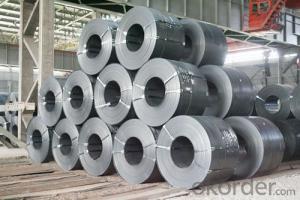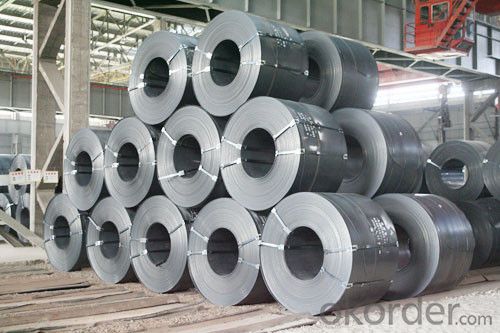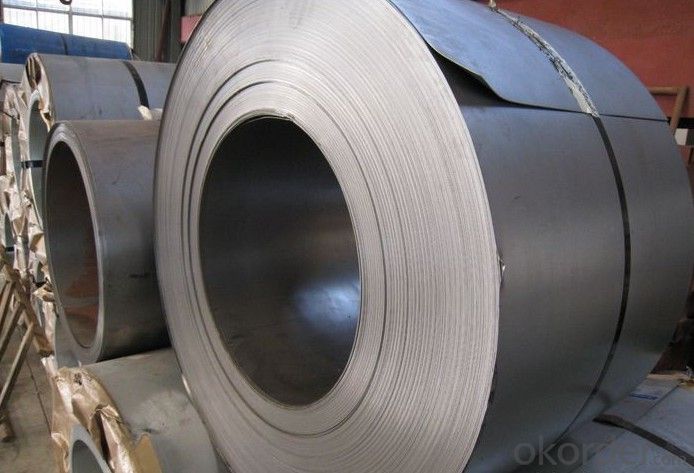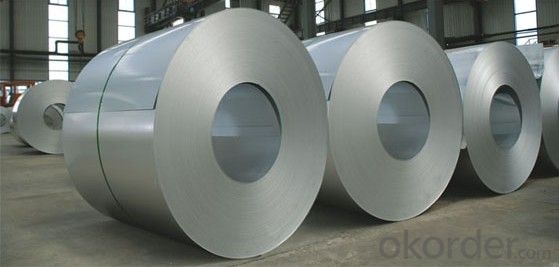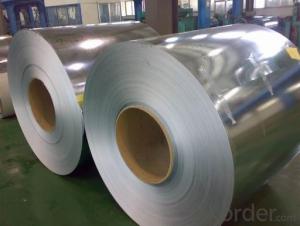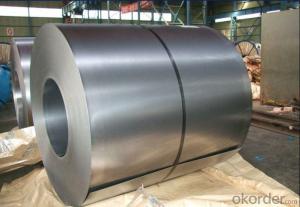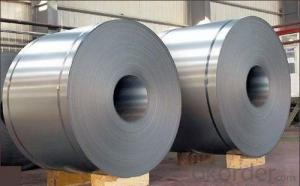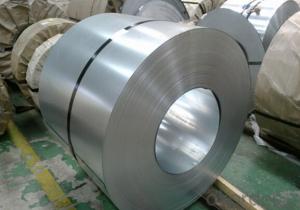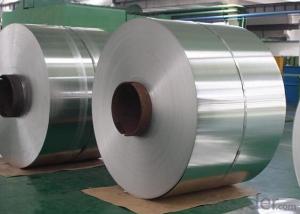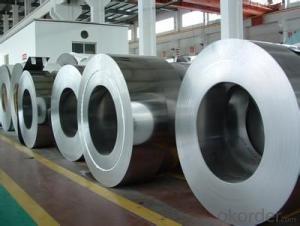Grade Q450NQR1 Corten Steel Coil 2.0*1000*C
- Loading Port:
- Shanghai
- Payment Terms:
- TT or LC
- Min Order Qty:
- 100 m.t
- Supply Capability:
- 20000 m.t/month
OKorder Service Pledge
OKorder Financial Service
You Might Also Like
Grade Q450NQR1 Corten Steel Coil 2.0*1000*C
Description:
-Grade: 09CuPCrNi-A
-Specification: 2.0*1000 in coil
Chemical Composition(%) of Grade Q450NQR1 Corten Steel Coil 2.0*1000*C:
| C | Si | Mn | P | S | Cu | Ti/V | Cr | Ni | RE |
| ≤0.12 | 0.25~0.75 | 0.20~0.50 | 0.060~0.12 | ≤0.020 | 0.25~0.50 | / | 0.30~1.25 | 0.12~0.65 | / |
Mechanical Properties of Grade Q450NQR1 Corten Steel Coil 2.0*1000*C:
| Thickness(mm) | Y.S(MPa) | T.S(MPa) | EL. A5% | Bend 180o | Impact Test | |
| oC | AKV J | |||||
| 2.0~≤6.0 | ≥345 | ≥480 | ≥24 | d=a | Normal/-40 | ≥47/≥21 |
| >6.0~12.0 | d=2a | |||||
Application of Grade Q450NQR1 Corten Steel Coil 2.0*1000*C:
Used in different weather. It has good anti rust protection and welding ability and is used in shipping container,support frame of outside building etc. Remarkably enhances the anti-corrosive performance of the structural element, lengthens the structural element service life, uses in manufacturing each kind of structural element which was used under the atmospheric envirenment and the caustic gas, the liquid envirenment.
Payment:
-Invoicing on theoretical weight or actual weight as customer’s request.
-FOB, CFR or CIF.
-Regular terms of payment:
1, 30% payment in advance, the remaining balance (70% payment) against the copy of B/L.
2, 30% payment in advance, the remaining balance (70% L/C) against the copy of B/L.
3, Negotiable.
-The payment terms will be written in contraction detailedly.
FAQ:
Q1: Why buy Materials & Equipment from OKorder.com?
A1: All products offered byOKorder.com are carefully selected from China's most reliable manufacturing enterprises. Through its ISO certifications, OKorder.com adheres to the highest standards and a commitment to supply chain safety and customer satisfaction.
Q2: How do we guarantee the quality of our products?
A2: We have established an advanced quality management system which conducts strict quality tests at every step, from raw materials to the final product. At the same time, we provide extensive follow-up service assurances as required.
Q3: How soon can we receive the product after purchase?
A3: Within three days of placing an order, we will arrange production. The shipping date is dependent upon the quatity, how many sizes you want and the plan of production, but is typically 1 month to 2 month days from the beginning of production.
Images of Grade Q450NQR1 Corten Steel Coil 2.0*1000*C:
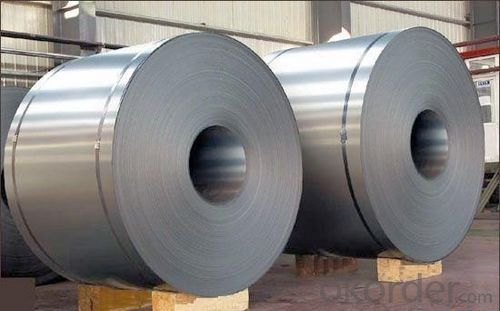
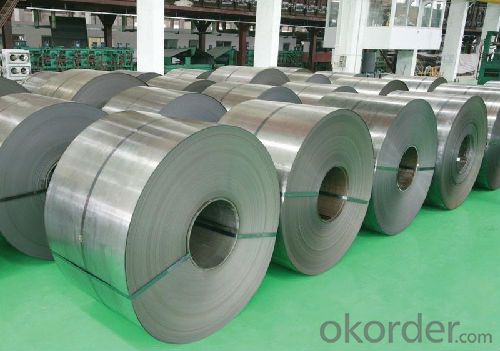
*If you would like to get our price, please inform us the size, standard/material and quantity. Thank you very much for your attention.
- Q: What are the different coating techniques for special steel parts?
- There are several coating techniques that can be used for special steel parts, depending on the specific requirements and desired properties. Here are some of the commonly used coating techniques: 1. Electroplating: This technique involves depositing a layer of metal onto the surface of the steel part through an electrochemical process. It provides excellent corrosion resistance and can also enhance the appearance of the part. 2. Thermal spraying: This technique involves melting or heating a coating material and spraying it onto the steel surface. It can be done using various methods such as flame spraying, plasma spraying, or arc spraying. Thermal spraying is commonly used to provide wear resistance, thermal insulation, or to restore damaged parts. 3. PVD (Physical Vapor Deposition): PVD is a vacuum coating technique where a thin film is deposited onto the steel surface. This method offers a wide range of coatings, including decorative finishes, hard coatings for wear resistance, and low-friction coatings. 4. DLC (Diamond-Like Carbon) coating: DLC is a type of PVD coating that provides a thin layer of carbon-based material with properties similar to diamond. It offers excellent hardness, low friction, and high wear resistance, making it suitable for applications where durability and performance are crucial. 5. Powder coating: Powder coating involves applying a dry powder to the steel part and then curing it through heat or ultraviolet light. This technique provides a durable and attractive finish, offering excellent corrosion resistance and protection against impact and abrasion. 6. Chemical conversion coating: This technique involves treating the steel surface with a chemical solution that forms a protective layer on the surface. Common types of chemical conversion coatings include phosphating, chromating, and anodizing. These coatings improve corrosion resistance, paint adhesion, and can also provide electrical conductivity. It is essential to choose the appropriate coating technique based on factors such as the desired properties, environmental conditions, cost-effectiveness, and the specific application requirements for special steel parts.
- Q: What is the difference between general steel and special steel?
- Pu steel: full name ordinary steel, mostly with plates, profiles and wire form. Ordinary steel is the basic material of the earliest, the largest amount of use in industry, widely used in architectural structure, bridge components, hull structure, transportation, machinery manufacturing, agriculture, textile, defense industry, metal products, food industry, household appliances and other various departments of the national economy.
- Q: Can special steel be used in the mining equipment manufacturing industry?
- Yes, special steel can be used in the mining equipment manufacturing industry. Special steel, such as wear-resistant steel, high-strength steel, or corrosion-resistant steel, is often used in the manufacturing of mining equipment due to its durability, toughness, and resistance to harsh conditions commonly encountered in mining operations. Special steel can enhance the performance and lifespan of mining equipment, making it a suitable choice for this industry.
- Q: What are the different joining processes for special steel?
- There are various joining processes for special steel, including welding, brazing, and soldering. Welding involves melting the steel and fusing it together, while brazing uses a filler metal with a lower melting point to join the steel parts. Soldering, on the other hand, uses a lower melting point alloy to create a bond between the steel pieces. Each process has its own advantages and limitations, and the choice depends on factors such as the type of steel, the desired strength of the joint, and the application requirements.
- Q: How does special steel contribute to reducing greenhouse gas emissions?
- Special steel contributes to reducing greenhouse gas emissions in several ways. Firstly, it is used in the production of energy-efficient vehicles, such as electric cars, which have lower emissions compared to conventional vehicles. Additionally, special steel is employed in the construction of wind turbines, which generate clean and renewable energy, reducing the reliance on fossil fuels. Furthermore, special steel is utilized in the manufacturing of energy-efficient appliances and buildings, which consume less energy and subsequently emit fewer greenhouse gases. Overall, the use of special steel in various sectors promotes sustainable practices and helps mitigate the impact of greenhouse gas emissions on the environment.
- Q: Does special steel have any magnetic properties?
- Yes, special steel can have magnetic properties, depending on its composition and treatment. Steel is primarily composed of iron, and iron is a ferromagnetic material, meaning it can be magnetized. However, the presence of other elements such as nickel, cobalt, and certain alloys can affect the magnetic properties of steel. For instance, stainless steel, which contains chromium and nickel, is generally non-magnetic or only weakly magnetic. On the other hand, materials like tool steel or high-speed steel can exhibit stronger magnetic properties due to their composition and heat treatment. Therefore, it is important to consider the specific type of special steel and its alloying elements when determining its magnetic properties.
- Q: What are the different methods of surface polishing for special steel?
- There are several methods of surface polishing for special steel, each with its own advantages and applications. Some of the commonly used methods include mechanical polishing, electrochemical polishing, and chemical polishing. 1. Mechanical Polishing: This method involves the use of abrasive materials to remove surface imperfections and create a smooth and reflective surface. It can be done manually or using automated polishing machines. Mechanical polishing is effective for removing scratches, dents, and other surface defects. It is commonly used in industries such as automotive, aerospace, and precision engineering. 2. Electrochemical Polishing: Also known as electrolytic polishing, this method uses an electrolyte solution and an electric current to dissolve and remove surface material. Electrochemical polishing can provide a high level of surface smoothness and can be particularly useful for complex shapes and hard-to-reach areas. It is commonly used in industries such as medical devices, semiconductors, and jewelry manufacturing. 3. Chemical Polishing: This method involves the use of chemical solutions to selectively remove surface material and create a smooth finish. Chemical polishing is effective for removing oxide layers, stains, and contaminants. It is often used for stainless steel and other corrosion-resistant alloys. The process involves immersing the steel in a chemical bath and controlling factors such as temperature, concentration, and time to achieve the desired surface finish. 4. Electropolishing: Electropolishing is an electrochemical process that combines the benefits of electrochemical and chemical polishing. It involves the application of an electric current to remove surface material while simultaneously dissolving it in an electrolyte solution. Electropolishing can provide a highly smooth, clean, and corrosion-resistant surface finish. It is commonly used for stainless steel and other alloys in industries such as pharmaceutical, food processing, and semiconductor manufacturing. 5. Vibratory Polishing: This method utilizes vibrating media, such as ceramic chips or abrasive pellets, along with a polishing compound to remove surface imperfections. The steel parts are placed in a vibratory tumbler or bowl where the continuous movement causes the media to rub against the parts, resulting in a polished surface. Vibratory polishing is commonly used for small or delicate parts and can be an efficient and cost-effective method. Overall, the choice of surface polishing method for special steel depends on factors such as the desired surface finish, part geometry, material properties, and industry requirements. It is important to consider these factors and consult with experts or specialists to determine the most suitable method for a specific application.
- Q: What is the role of heat treatment in special steel?
- Enhancing the properties and performance of special steel is of utmost importance, and heat treatment plays a vital role in achieving this. Special steel refers to alloys that are deliberately designed to possess unique characteristics such as high strength, corrosion resistance, or heat resistance. To alter the microstructure of the steel and attain the desired properties, heat treatment involves subjecting it to controlled heating and cooling processes. Improving the mechanical properties of special steel is one of the primary functions of heat treatment. By carefully regulating the temperature during heating and controlling the rate of cooling, the steel's hardness, strength, and toughness can be greatly enhanced. For instance, procedures like quenching and tempering significantly increase the steel's strength and resistance to wear and fatigue. This makes it suitable for applications requiring high strength and durability, such as machinery, tools, or aerospace components. Heat treatment also plays a crucial role in optimizing the steel's resistance to corrosion. Special steel is frequently used in environments where it is exposed to harsh conditions like corrosive chemicals or high temperatures. By subjecting the steel to specific heat treatment processes like annealing or precipitation hardening, a more stable microstructure is developed, improving its resistance to corrosion and oxidation. This ensures that the special steel retains its structural integrity and performance even in challenging environments. Furthermore, heat treatment can modify the steel's heat resistance properties. Special steel often finds applications in industries where it is exposed to high temperatures, such as turbines or exhaust systems. Through heat treatment techniques like normalization or hardening, the steel can be made more resistant to deformation, cracking, or softening at elevated temperatures. This allows the special steel to maintain its strength and structural integrity even under extreme heat conditions. To summarize, heat treatment is crucial in optimizing the mechanical, corrosion resistance, and heat resistance properties of special steel. By carefully manipulating the steel's microstructure through controlled heating and cooling processes, heat treatment enhances its strength, durability, and performance, making it suitable for a wide range of demanding applications.
- Q: How does special steel contribute to the manufacturing of power generation equipment?
- Special steel plays a crucial role in the manufacturing of power generation equipment by offering exceptional strength, durability, and corrosion resistance. It is used to construct various components such as turbine blades, generator shafts, and pressure vessels, ensuring efficient and reliable power generation. Additionally, special steel's high temperature resistance enables it to withstand extreme operating conditions, ensuring the longevity and efficiency of power generation equipment.
- Q: What are the properties of corrosion-resistant stainless tool steel?
- Corrosion-resistant stainless tool steel possesses several properties that make it highly suitable for various applications. Firstly, it exhibits exceptional resistance to corrosion, even in harsh environments, due to the presence of a high percentage of chromium in its composition. This resistance helps prevent the formation of rust, stains, or pitting, ensuring durability and longevity. Additionally, this type of steel maintains its mechanical strength and hardness at elevated temperatures, making it ideal for tools and equipment subjected to high heat or wear. Furthermore, corrosion-resistant stainless tool steel offers excellent machinability, allowing for ease of shaping, cutting, and forming. Its combination of corrosion resistance, strength, and machinability makes it a popular choice for various industries, including manufacturing, construction, and automotive.
Send your message to us
Grade Q450NQR1 Corten Steel Coil 2.0*1000*C
- Loading Port:
- Shanghai
- Payment Terms:
- TT or LC
- Min Order Qty:
- 100 m.t
- Supply Capability:
- 20000 m.t/month
OKorder Service Pledge
OKorder Financial Service
Similar products
Hot products
Hot Searches
Related keywords
